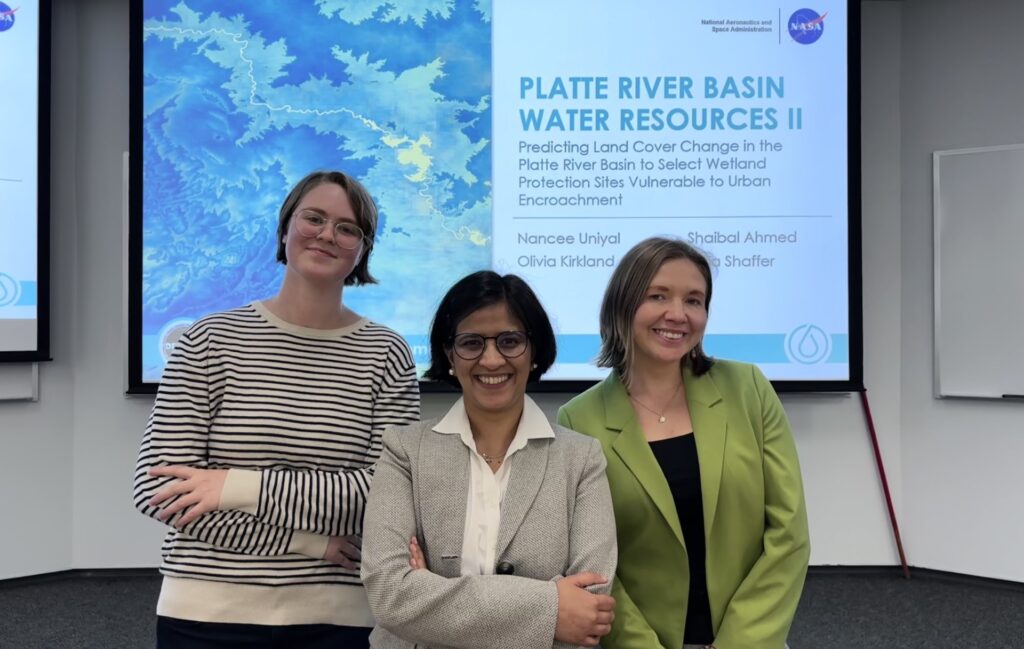Over the Summer, Yulia Shaffer, a current Ph.D. student, was awarded an incredible opportunity to work with NASA through their DEVELOP Program. This 10-week fellowship allowed Yulia to collaborate with an interdisciplinary team, applying earth observations to address contemporary issues facing society. The selection process was highly competitive, with only 100 applicants chosen from over 1,000 submissions received. The committee sought candidates with skills in remote sensing and spatial analysis, as well as exceptional technical, communication, and leadership abilities.
 During the fellowship, Yulia focused on acquiring ancillary and earth observation data. She used this data to develop a simulation model projecting future growth within the Platte River Basin and identifying wetlands vulnerable to encroachment. Each week, Yulia tackled new and exciting tasks, working closely with team members, partners, and science advisors to address current and future environmental challenges.
During the fellowship, Yulia focused on acquiring ancillary and earth observation data. She used this data to develop a simulation model projecting future growth within the Platte River Basin and identifying wetlands vulnerable to encroachment. Each week, Yulia tackled new and exciting tasks, working closely with team members, partners, and science advisors to address current and future environmental challenges.
Yulia has always been captivated by the built environment and how the spaces we inhabit are not only a reflection of societal needs but actively shape our daily experiences and the quality of our lives. Her architectural background taught her to appreciate the complexity of space, from the aesthetics of design to the practicalities of functionality. She found herself fascinated by the subtle ways architecture can influence behavior, community interaction, and even personal well-being.
This fascination deepened during her master’s studies in sustainability, where she realized the critical role of sustainable design in the built environment—how the choices made today can create resilient cities and communities for tomorrow. Yulia became passionate about the idea that architecture isn’t just about creating beautiful or functional spaces, but about contributing to a more ecologically sound future. The challenge of balancing human needs with environmental stewardship drives her every day, and she is committed to ensuring that the spaces we build not only enhance our lives but also contribute to the well-being of the planet.
Several areas of Yulia’s studies fascinate her, and she believes they all intertwine to shape her broader understanding of the built environment. One of her primary interests lies in exploring how space is used in urban environments, with a particular focus on integrating green spaces in cities and densely populated areas. In environments where there is an urgent need to improve ecological footprints, understanding how to balance human activity with sustainability becomes critical. She is particularly drawn to researching the challenge of designing and analyzing green spaces that enhance urban life while addressing environmental concerns.
Another area that excites Yulia is using tools like Geographic Information Systems (GIS) or Remote Sensing to analyze existing environmental challenges and identify shortcomings in urban planning. For example, she conducted a network analysis for an Environmental Planning course, exploring the accessibility of urban green spaces in Chicago for vulnerable populations such as the elderly, children, and economically disadvantaged groups. This project gave her valuable insight into how GIS can inform more equitable urban planning by revealing disparities in access to vital resources.
Additionally, Yulia is deeply passionate about studying how cities evolve over time. She is intrigued by the various social, political, and economic factors that drive urban transformation, how these shifts are reflected in the city’s physical form and spatial dynamics, and how those changes, in turn, reshape our lives, attitudes, and perceptions. Understanding the intersection of urban morphology, public policy, and environmental sustainability helps her explore ways to make cities more adaptive, inclusive, and resilient to future challenges.
The Ph.D. program and its outstanding faculty were the main attractions that drew Yulia to the College of Environment + Design. She first discovered the program during the pandemic when life had slowed down, giving everyone more time to reflect. At the time, she was working full-time as an Operations Coordinator for a nonprofit in Asheville, providing free energy efficiency upgrades for vulnerable households with the help of volunteers. While she was grateful to have a stable job during a time when many were struggling, she began feeling the need for change and a deeper engagement with the issues she cared about. Reflecting on her background in architecture, biology, and sustainability, she realized she wanted to transition into urban planning.
The CED Ph.D. program, the first she came across in the Southeast, immediately resonated with her, and she knew it was the right fit. She didn’t need to look any further; she had found what she was searching for. While she didn’t fully realize how challenging pursuing a Ph.D. would be, three years in, despite the ongoing challenges and uncertainties about the future, she has no regrets. This has been a profoundly rewarding experience, both intellectually and personally for Yulia. She is especially grateful for the opportunity to be an instructor and to work alongside some of the brightest minds in the field, passionate about the work they do.

